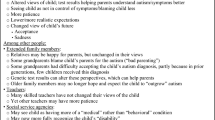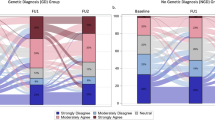Abstract
Parents of children with autism who receive genetic diagnoses of de novo variants face challenges in understanding the implications for reproductive decision-making. We interviewed 28 parents who received de novo genetic diagnoses for their child’s autism and intellectual disability (ID). These genetic variants proved to have reproductive implications for not only the child’s parents, but the child and his/her neurotypical siblings, aunts, uncles, and cousins. Parents had often already finished building their families but varied, overall, in whether the results had affected, or might have influenced, their reproductive decisions. Parents’ views were shaped by factors related to not only genetics, but also parental age, financial considerations, competing hopes and visions for their family’s future, perceived abilities to care for an additional child with similar symptoms, and the extent of the child’s symptoms. Members of a couple sometimes disagreed about whether to have more children. Parents pondered, too, the possibility of preimplantation genetic testing, though misunderstandings about it arose. Children with autism vary widely in their abilities to understand the reproductive implications of genetic diagnoses for themselves. Neurotypical offspring were much relieved to understand that their own children would not be affected. While some autism self-advocates have been concerned that genetic testing related to autism could lead to eugenics, the present data, concerning de novo genetic findings, raise other perspectives. These data, the first to explore several key aspects of the reproductive implications of genetic diagnoses for this group, have important implications for future practice, education, and research—e.g., concerning various family members.

Similar content being viewed by others
References
André TG, Valdez-Montero C, Márquez-Vega MA, Ahumada-Cortez JG, Gámez Medin ME (2020) Communication on sexuality between parents and adolescents with autism spectrum disorder: a systematic review. Sex Disabil 38:217–229. https://doi.org/10.1007/s11195-020-09628-1
Bai D, Marrus N, Yip BHK, Reichenberg A, Constantino JN, Sandin S (2020) Inherited risk for autism through maternal and paternal lineage. Biol Psychiatr 88(6):480–487. https://doi.org/10.1016/j.biopsych.2020.03.013
Breuss MW, Antaki D, George RD, Kleiber M, James KN, Ball LL et al (2020) Autism risk in offspring can be assessed through quantification of male sperm mosaicism. Nat Med 26(1):143–150. https://doi.org/10.1038/s41591-019-0711-0
Chen LS, Xu L, Huang TY, Dhar SU (2013) Autism genetic testing: a qualitative study of awareness, attitudes, and experiences among parents of children with autism spectrum disorders. Genet Med 15(4):274–281. https://doi.org/10.1038/gim.2012.145
Chen WJ, Zhao S, Huang TY, Kwok OM, Chen LS (2020) Autism spectrum disorders: prenatal genetic testing and abortion decision-making among Taiwanese mothers of affected children. Int J Environ Res Public Health 17(2):476. https://doi.org/10.3390/ijerph17020476
Chiurazzi P, Kiani A, Miertus J, Paolacci S, Barati S, Manara E, Stuppia L, Gurrieri F, Bertelli M (2020) Genetic analysis of intellectual disability and autism. Acta Biomed 91(13-S):e2020003. https://doi.org/10.23750/abm.v91i13-S.10684
Corbin J, Strauss A (2014) Basics of qualitative research: techniques and procedures for developing grounded theory (4th ed). SAGE Publications, Inc., Thousand Oaks, CA
Fuse K (2010) Variations in attitudinal gender preferences for children across 50 less-developed countries. Demogr Res 23(36):1031–1048. https://doi.org/10.4054/DemRes.2010.23.36
Guest G, Bunce A, Johnson L (2006) How many interviews are enough? An experiment with data saturation and variability. Field Methods 18(1):59–82. https://doi.org/10.1177/1525822X052799
Hennink MM, Kaiser BN, Marconi VC (2017) Code saturation versus meaning saturation: how many interviews are enough? Qual Health Res 27(4):591–608. https://doi.org/10.1177/1049732316665344
Hens K, Peeters H, Dierickx K (2016) The ethics of complexity. Genetics and autism, a literature review. Am J Med Genet B Neuropsychiatr Genet 171B(3):305–316. https://doi.org/10.1002/ajmg.b.32432
Hyman SL, Levy SE, Myers SM, Council on Children with Disabilities, Section on Developmental and Behavioral Pediatrics (2020) Identification, evaluation, and management of children with autism spectrum disorder. Pediatrics 145(1):e20193447. https://doi.org/10.1542/peds.2019-3447
Klitzman R (2012) Am I my genes? Confronting fate and family secrets in the age of genetic testing. Oxford University Press, New York
Klitzman R (2015) The ethics police?: the struggle to make human research safe. Oxford University Press, New York
Klitzman R (2019) Designing babies: how technology is changing the ways we create children. Oxford University Press, New York
Klitzman R, Bayer R (2003) Mortal secrets: truth and lies in the age of AIDS. Johns Hopkins University Press, Baltimore
Klitzman R, Bezborodko E, Chung WK, Appelbaum PS (2023) Impact of receiving genetic diagnoses on parents’ perceptions of their children with autism and intellectual disability [manuscript submitted for publication]. Columbia University
Maenner MJ, Warren Z, Williams AR, Amoakohene E, Bakian AV, Bilder DA, …, Shaw KA (2023) Prevalence and characteristics of autism spectrum disorder among children aged 8 years – autism and developmental disabilities monitoring network, 11 sites, United States, 2020. MMWRR Surveill Summ 72(2):1–14. https://doi.org/10.15585/mmwr.ss7202a1
Maia N, Nabais Sá MJ, Melo-Pires M, de Brouwer APM, Jorge P (2021) Intellectual disability genomics: current state, pitfalls and future challenges. BMC Genomics 22(1):909. https://doi.org/10.1186/s12864-021-08227-4
Ozonoff S, Young GS, Carter A, Messinger D, Yirmiya N, Zwaigenbaum L et al (2011) Recurrence risk for autism spectrum disorders: a baby siblings research consortium study. Pediatrics 128(3):e488–e495. https://doi.org/10.1542/peds.2010-2825
Palmer N, Beam A, Agniel D, Eran A, Manrai A, Spettell C et al (2017) Association of sex with recurrence of autism spectrum disorder among siblings. JAMA Pediatr 171(11):1107–1112. https://doi.org/10.1001/jamapediatrics.2017.2832
Paula CS, Cukier S, Cunha CR, Irarrázaval M, Montiel-Nava C, Garcia R, Rosoli A, Valdez D, Bordini D, Shih A, Garrido G, Rattazzi A (2020) Challenges, priorities, barriers to care, and stigma in families of people with autism: similarities and difference among six Latin American countries. Autism 24(8):2228–2242. https://doi.org/10.1177/1362361320940
Rylaarsdam L, Guemez-Gamboa A (2019) Genetic causes and modifiers of autism spectrum disorder. Front Cell Neurosci 13:385. https://doi.org/10.3389/fncel.2019.00385
Sanderson K (2021) High-profile autism genetics project paused amid backlash. Nature 598(7879):17–18. https://doi.org/10.1038/d41586-021-02602-7
Shu C, Green Snyder L, Shen Y, Chung WK, the SPARK Consortium (2022) Imputing cognitive impairment in SPARK, a large autism cohort. Autism Res 15(1):156–170. https://doi.org/10.1002/aur.2622
SPARK: Simons Foundation Powering Autism Research for Knowledge (2023) About SPARK https://sparkforautism.org/portal/page/about-spark/ (Accessed September 26, 2023).
Sparrow SA, Cicchetti DV, Saulnier CA (2016) Vineland Adaptive Behavior Scales, 3rd edn. Pearson Assessments, San Antonio, TX
Sumi S, Taniai H, Miyachi T, Tanemura M (2006) Sibling risk of pervasive developmental disorder estimated by means of an epidemiologic survey in Nagoya, Japan. J Hum Genet 51:518–522. https://doi.org/10.1007/s10038-006-0392-7
Tabor HK, Brazg T, Crouch J, Namey EE, Fullerton SM, Beskow LM, Wilfond BS (2011) Parent perspectives on pediatric genetic research and implications for genotype-driven research recruitment. J Empir Res Hum Res Ethics 6(4):41–52. https://doi.org/10.1525/jer.2011.6.4
Tolbert J, Drake P, Damico A (2022, December 19) Key facts about the uninsured population. KFF https://www.kff.org/uninsured/issue-brief/key-facts-about-the-uninsured-population/ (Accessed September 26, 2023)
Tong A, Sainsbury P, Craig J (2007) Consolidated criteria for reporting qualitative research (COREQ): A 32-item checklist for interviews and focus groups. Int J Qual Health Care 19(6):349–357. https://doi.org/10.1093/intqhc/mzm042
Wynn J, Karlson A, Levine A, Huber B, Salem A, Casey White L, … Appelbaum PS (2023) Impact of a genetic diagnosis of a child’s autism on parental perceptions. [Manuscript submitted for publication]. Columbia University.
Acknowledgements
The authors would like to thank Julia Wynn, MS, CGC, and the SPARK study staff for facilitating our access to these participants and data collection and Timothy Keith Hung, Beverly Gu, Rebecca Grinberg, and especially Patricia Contino for their assistance with the preparation of the manuscript.
Research data policy and data availability statement
The interviewees discussed identifying details in their open-ended responses, concerning themselves, various family members, and providers, and the process of de-identification would be very difficult and complicated, so the data are not publicly available. Data used are available from the corresponding author on reasonable request.
Funding
This research was supported by funding from the National Human Genome Research Institute (NHGRI), Center for Excellence in ELSI Research (CEER) grant program, #RM1HG007257 (Paul Appelbaum, PI), the NICDH Autism Center of Excellence grant P50HD109879 (Wendy Chung, PI), and SPARK: Simons Powering Autism Research.
Author information
Authors and Affiliations
Contributions
Robert Klitzman, Paul S. Appelbaum, Wendy K. Chung, and Ekaterina Bezborodko contributed to the conceptualization, writing, data analysis, revising and drafting of the article.
Corresponding author
Ethics declarations
Research involving human participants and/or animals
Not applicable to this study and paper. The Columbia University Department of Psychiatry/New York State Psychiatric Institute Institutional Review Board approved the study.
Informed consent
We obtained informed consent from all of the participants. We thank the study participants for giving their time and perspective.
Conflict of interest
The authors declare no competing interests.
Additional information
Publisher’s Note
Springer Nature remains neutral with regard to jurisdictional claims in published maps and institutional affiliations.
Rights and permissions
Springer Nature or its licensor (e.g. a society or other partner) holds exclusive rights to this article under a publishing agreement with the author(s) or other rightsholder(s); author self-archiving of the accepted manuscript version of this article is solely governed by the terms of such publishing agreement and applicable law.
About this article
Cite this article
Klitzman, R., Bezborodko, E., Chung, W.K. et al. Receiving de novo genetic diagnoses for autism with intellectual disability: parents’ views of impacts on families’ reproductive decisions. J Community Genet 15, 85–96 (2024). https://doi.org/10.1007/s12687-023-00679-3
Received:
Accepted:
Published:
Issue Date:
DOI: https://doi.org/10.1007/s12687-023-00679-3




